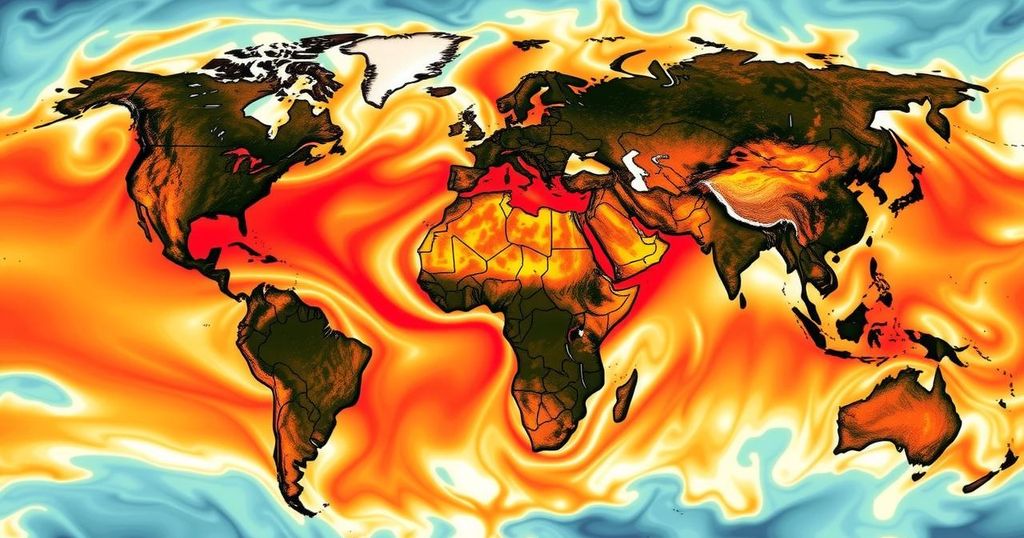In 2024, global temperatures exceeded 1.5 degrees Celsius, marking it the hottest year on record. Extreme weather events, including major flooding and droughts, ensued, affecting numerous regions worldwide. This unprecedented milestone raises significant concerns regarding climate change’s impacts and highlights the need for immediate action to reduce emissions and adapt infrastructure.
The year 2024 has been marked as the hottest year on record, as affirmed by a report from the EU’s Copernicus Climate Change Service. This milestone was reached as global average temperatures surpassed 1.5 degrees Celsius above pre-industrial levels for the first time ever. Several extreme weather events, including devastating flooding in April that resulted in hundreds of deaths in Pakistan and Afghanistan, as well as severe drought conditions affecting the Amazon river, highlight the significant impacts of this temperature increase. In regions such as Greece, measures were taken to shield tourists from perilous heat, further illustrating the urgent challenges posed by the ongoing climate crisis.
The extent of climate change effects was not uniform, as all continents except Australasia and Antarctica reported record high temperatures. Eleven months of 2024 saw temperatures exceeding the critical threshold of 1.5 degrees Celsius, demonstrating that global warming is not an isolated issue but a pervasive reality impacting various regions. The previous hottest year, 2023, was surpassed, marking a continuous trend where all ten of the hottest years recorded have occurred in the past decade. The use of advanced reanalysis methods by Copernicus allowed for accurate estimations of temperature changes and extreme weather events, creating crucial datasets for climate research.
Despite this alarming development, it is essential to note that a single year surpassing the 1.5 degrees Celsius mark does not indicate that the long-term average has crossed this threshold. The long-term average temperature remains around 1.3 degrees Celsius, with annual fluctuations in climate making it possible for a temporary surge not to constitute a permanent change. Notably, contributing factors included a robust El Niño phenomenon, which can exacerbate weather conditions and elevate global temperatures, yet these same natural variances may mitigate temperature increases in different years.
The implications of climate change are profound, as even mild increases in temperature can lead to severe repercussions, such as the accelerated melting of ice sheets and increased intensity of heatwaves. In Europe, extreme weather culminated in scorching heat and wildfires, particularly affecting regions like Greece and the Balkans. Furthermore, a considerable portion of the globe experienced elevated heat stress mid-year, with significant adverse health impacts observed in low-income countries.
The report additionally indicated a rise in atmospheric moisture, leading to intensified rainfall events and flooding occurrences, such as those witnessed in Valencia, Spain. The relationship between moisture content and extreme rainfall is complex and influenced by various meteorological factors that may intensify weather patterns. To mitigate the ongoing and future effects of climate change, rapid reductions in greenhouse gas emissions and strategic infrastructure adaptations are paramount.
With the potential for cooler conditions in the Pacific, the world awaits whether 2025 will mirror 2024’s record heat. However, the significant rise in global temperatures serves as a critical reminder of the urgent need for comprehensive climate action.
The global climate crisis has reached alarming new heights, with 2024 designated as the hottest year recorded to date. This significant increase in temperature has serious implications for global health, ecosystems, and weather patterns. The Paris Agreement, set in 2015, underscores the urgent need to limit global warming to below 1.5 degrees Celsius; however, the latest findings from the Copernicus Climate Change Service indicate that this critical threshold has already been surpassed for the first time in recorded history.
The record-breaking temperatures in 2024 highlight an intensified climate crisis demanding immediate action. Urgent measures to reduce greenhouse gas emissions and adapt to changes in weather patterns are essential to prevent catastrophic climate impacts. As natural phenomena continue to interact with anthropogenic factors, it is crucial to remain vigilant and proactive in addressing climate change, reinforcing the importance of global commitments like the Paris Agreement.
Original Source: theprint.in







